Ad-blocker is an application to stop annoying advertisements while browsing the web or using the system in general.
This form of disturbance comes in many forms, such as banners, notifications, pop-overs, full-screen ads, and the worst of them all–auto-play videos. And while every user despises adverts, a very small percentage pays for the content they consume. So it becomes an unavoidable way of survival for the publishers and (free) app developers.
But sometimes, they overdo it, impacting browsing speed, data usage, and battery life. Besides, most ads track users across devices and platforms for targeted engagement, giving no regard for digital privacy.
That’s why our team at Geekflare has researched and made this list of ad blockers based on various factors like ethical ad blocking, browser integration, anti-tracking protection and automatic tracker blocking.
- 1. AdLock – Best Overall
- 2. Avast AntiTrack – Best for Anti-Tracking Protection
- 3. AdGuard – Best for Customizable Ad Blocking
- 4. AdBlock – Best for Browser Integration
- 5. Clario – Best for All-in-One Cybersecurity
- 6. Adblock Plus – Best for Ethical Ad Blocking
- 7. Ghostery – Best for Transparency and Control
- 8. Vivaldi Browser – Best for Integrated Browser Experience
- 9. Privacy Badger – Best for Automatic Tracker Blocking
- Show less
1. AdLock
Best Overall
AdLock is an ad-blocking utility to put a full stop to system-wide advertisements, including in web browsers and applications. It has apps for major operating systems (Windows, macOS, Android, and iOS) and browsers (Chrome, Firefox, and Safari).

In addition to being an excellent ad blocker, AdLock checks for harmful links, protects the data, and shields users from spyware. It blocks all ads by default. Users are able to allowlist websites to support the content creators they love.
AdLock offers a secure surfing feature, which is based on the Safe Browsing service by Google. It safeguards users from cyberattacks like phishing by checking each clicked link against a database of unsafe websites.
AdLock is available for free with its browsing extensions with 14-day premium trials of its apps with options to subscribe later.
AdLock Pros
System-wide ad blocking.
Malware protection.
Free version and premium trial.
Apps for major operating systems and browsers.
AdLock Cons
Pricey monthly subscription.
Android app needs to be sideloaded.
iOS adblock works only within Safari.
AdLock Pricing
- Monthly: $7.95 (up to five devices).
- Annually: $2.93/month (up to five devices).
2. Avast AntiTrack
Best for Anti-Tracking Protection
Avast AntiTrack is primarily an anti-tracking utility to stop online user profiling. It stops targeted ads which reveal your browsing history or online purchases. This mainly works by spoofing your digital fingerprint and notifying users of any tracking attempts.

In addition, Avast AntiTrack keeps you safe on public WiFi, unlocks location-restricted content, and hides your actual geographical location. Another upside of using Avast AntiTrack is that it doesn’t break websites as some inefficient ad blockers do.
To clarify, Avast AntiTrack isn’t a conventional ad blocker. It limits targeted advertising but doesn’t stop ads in general.
Avast AntiTrack Pros
Stops personalized ads.
Secures public WiFi.
Doesn’t break websites.
30-day free trial.
Avast AntiTrack Cons
You can still see non-personalized ads.
Core ad-blocking features like allowlisting aren’t there.
iOS app isn’t there.
Avast AntiTrack Pricing
- One device (Windows): $54.99/year.
- Ten devices (Windows & Apple): $64.99/year.
3. AdGuard
Best for Customizable Ad Blocking
AdGuard is a dedicated ad blocker to remove all kinds of ads from browsers and installed applications. Users also get protection against spyware, phishing, and malware attacks. Its customized ad blocking lets users apply filters to prevent language-specific ads, allowlist websites, and create rules for specific websites.
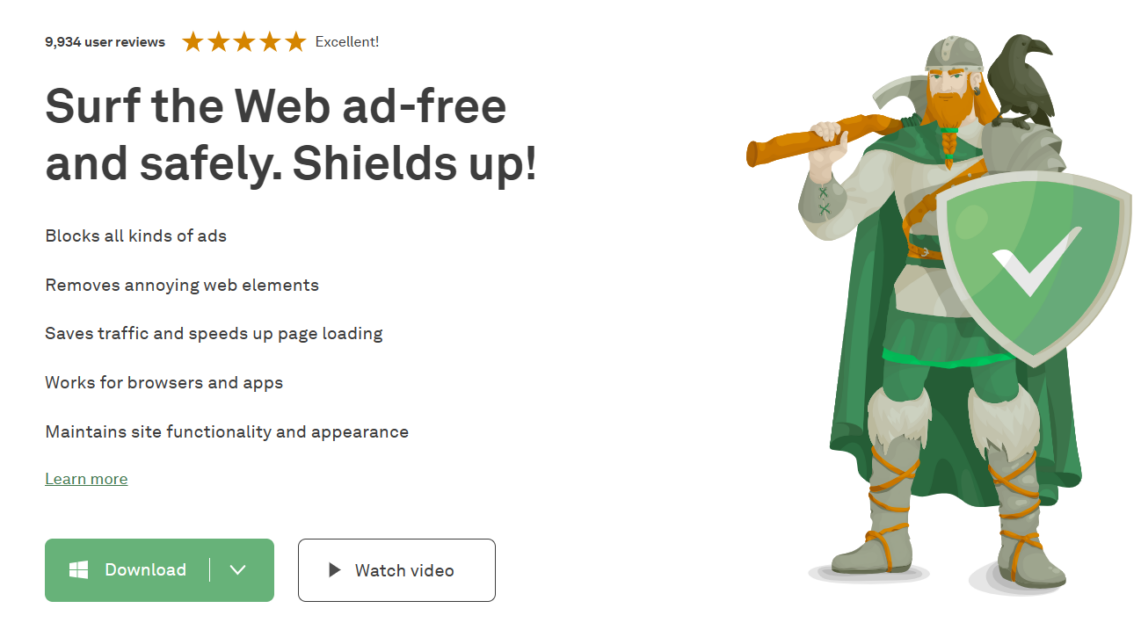
AdGuard has additional functionality, such as operating as a parental control app for your kid’s devices by blocking adult content. You can also allowlist/blocklist specific websites to make this work even better.
AdGuard has a stealth mode that works similar to anti-tracking utilities. It has applications for Windows, Mac, Android, iOS, and extensions for popular browsers.
Note for Android users: AdGuard has a content blocker listed on Google Play Store, which is vastly inferior (in terms of overall ad-blocking) to the standalone app (AdGuard for Android) you can download via its website.
AdGuard Pros
Powerful free version to remove browser-based ads.
Customized ad blocking.
One-time payment available.
Free version and premium trial available.
Works great alongside AdGuard VPN.
AdGuard Cons
Android apps need to be sideloaded.
iOS ad-blocking is limited to the Safari browser.
AdGuard Pricing
- Personal (up to 3 devices): $2.49/month billed annually, $79.99 one-time.
- Family (up to 9 devices): $5.49/month billed annually, $169.99 one-time.
4. AdBlock
Best for Browser Integration
AdBlock is a popular ad blocker specialized in working on desktop and mobile browsers. This works to block intrusive ads while letting users to allowlist their favorite websites/creators for supporting their work.
AdBlock functions as a smart YouTube ad blocker with the option to allowlist select channels to help your favorite creators.
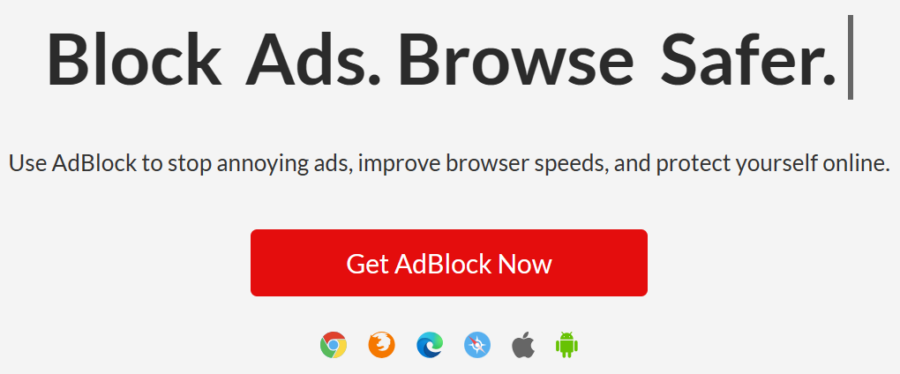
Besides the usual ad blocking, AdBlock is focused on safeguarding its users from cryptojacking.
Cryptojacking refers to malicious websites using their visitors’ computational resources for cryptocurrency mining without their consent.
AdBlock has a browser extension with a basic set of features available for free. Its premium subscription offers advanced capabilities, including blocking cookie banners, custom rules, dark mode, and settings sync across devices. One interesting feature of the paid subscription is themes, which lets users swap the ad space with their custom images.
AdBlock is a member of the Acceptable Ads Program, which lets publishers show non-intrusive ads, such as pop-ups and video adverts, by default.
AdBlock Pros
Powerful free features.
Supports publishers by showing acceptable ads.
Sync across devices.
AdBlock Cons
No application for system-wide ad blocking.
YouTube ad blocking can be inconsistent.
AdBlock Pricing
AdBlock premium: $2/month, $20 annually
5. Clario
Best for All-in-One Cybersecurity
Clario is a cybersecurity suite in one simple subscription comprising an ad blocker, a virtual private network (VPN), an anti-tracker, an antivirus, and more. Its ad-blocking capabilities can be used directly with its extension for Safari or via native applications for Windows, macOS, Android, and iOS
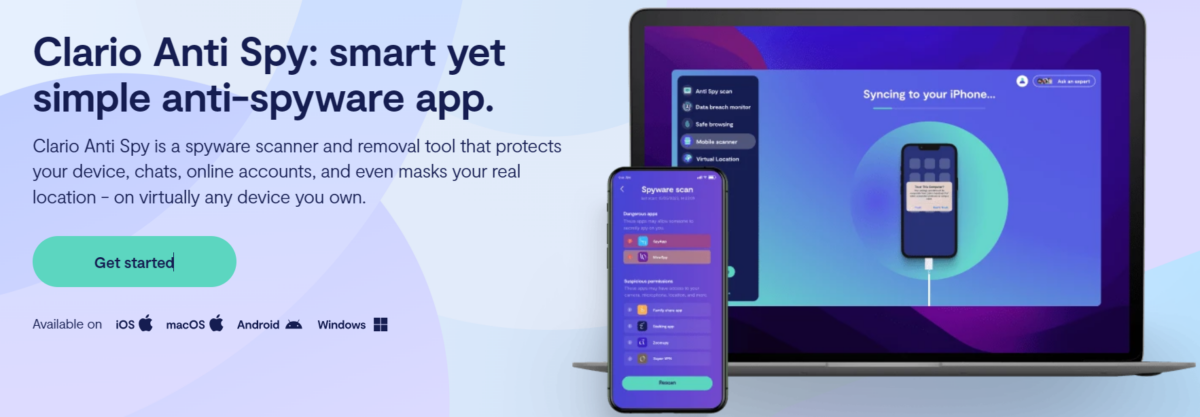
Clario lets users allowlist websites. Besides an ad blocker, this application offers phishing protection and anti-tracking measures for robust online security.
Clario’s subscriptions cover any three devices at a time. You can get started by answering a simple survey, which lands on a subscription page to continue.
Clario Pros
Malware protection.
In-built VPN interface.
24/7 Chat support within the app.
Clario Cons
Expensive for someone needing only ad-blocking.
Can’t block system-wide ads.
Limited presence for mobile platforms.
Clario Pricing
- 1-month: $14.99
- 3-months: $34.99
- 6-months: $49.99
6. Adblock Plus
Best for Ethical Ad Blocking
Adblock Plus is a browser-based ad blocker. It has extensions for major desktop browsers, such as Chrome, Firefox, Safari, Edge, Opera, and Yandex. For mobile platforms, it works on Android (for Samsung Internet browser) and iOS (Safari).
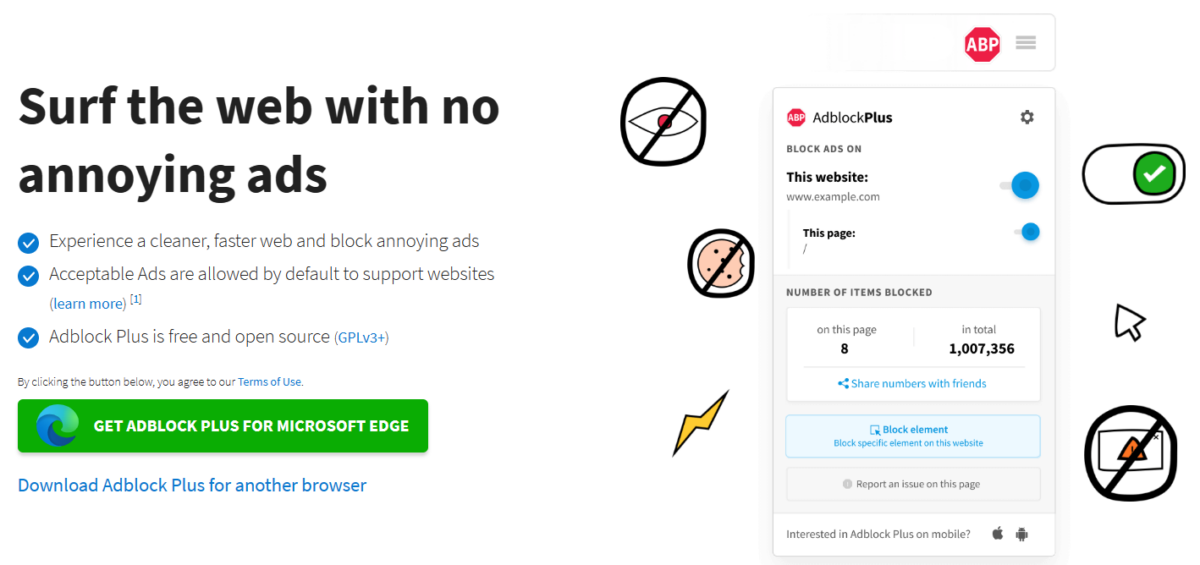
Adblock Plus is effective in blocking invasive adverts. It shows acceptable ads by default to support publishers. However, a user can configure it to show no ads at all.
The basic version of Adblock Plus is completely free and open source. Adblock Plus premium is more potent in blocking video ads, cookie banners, website notifications, and more. Besides, it lets users allowlist websites to selectively apply ad-blocking.
Adblock Pros
One of the best browser-based ad-blocker.
Powerful free version.
Supports acceptable ad policy.
Adblock Cons
Can’t stop system-wide adverts.
Fewer options for mobile ad blocking.
Adblock Plus Premium Pricing
Freemium version available.
Monthly: $4
Yearly: $40
7. Ghostery
Best for Transparency and Control
Ghostery is a 100% free and open-source ad-blocking browsing extension that works on popular desktop browsers, including Chrome, Firefox, Edge, Safari, and Opera, and mobile browsers, such as Safari (iOS and iPadOS) and Firefox (Android).
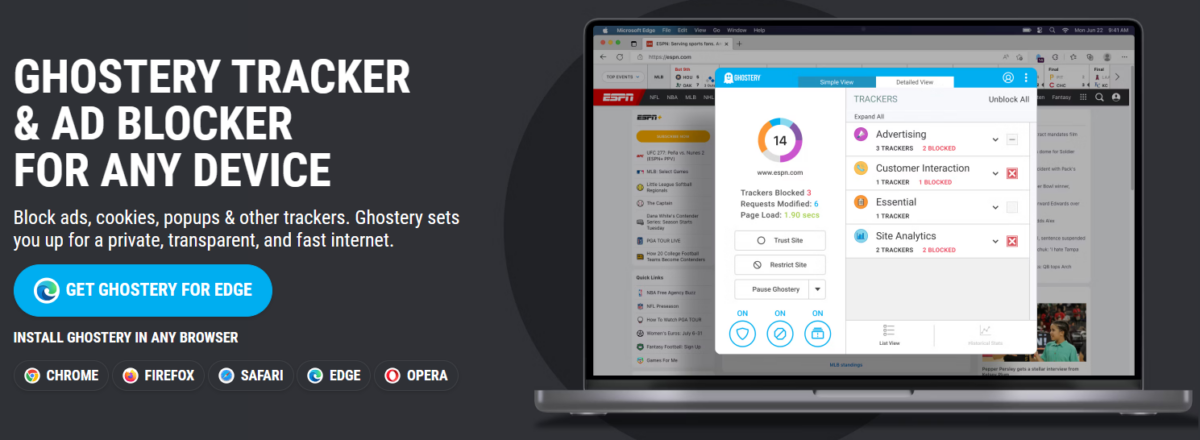
Ghostery isn’t about plain simple adblocking. Instead, it gives detailed insights into every website a user visits, including the trackers blocked, tracker modified, and page load time. Each page load gives a simple and detailed view of the tracker’s behavior. The Simple view tells the total number of trackers blocked and modified. On the contrary, the detailed view lets a user allow or block specific trackers on the active webpage or restrict them everywhere.
Ghostery bakes standard ad blocking, anti-tracking, and a new feature, Never Consent, into one interface. Never Consent prevents websites from sending cookie consent pop-ups by automatically selecting privacy-respecting settings. Besides, a user is free to selectively turn on ad blocking and anti-tracking for websites.
The desktop extension interface allows pausing Ghostery for 30 mins to 24 hours. Ghostery is free, but users can still donate to support the developers.
Ghostery Pros
100% Free browser extension.
Powerful ad-blocking.
Fine-grained control over site-tracking behavior.
Ghostery Cons
No option for system-wide ad-blocking.
Limited support for mobile platforms.
Ghostery Pricing
Free
8. Vivaldi Browser
Best for Integrated Browser Experience
Vivaldi is one of the most feature-rich browsers, which comes integrated with an ad-blocker, among many other things, such as tracking protection, a notetaker, a screenshot tool, mobile sync, and more.
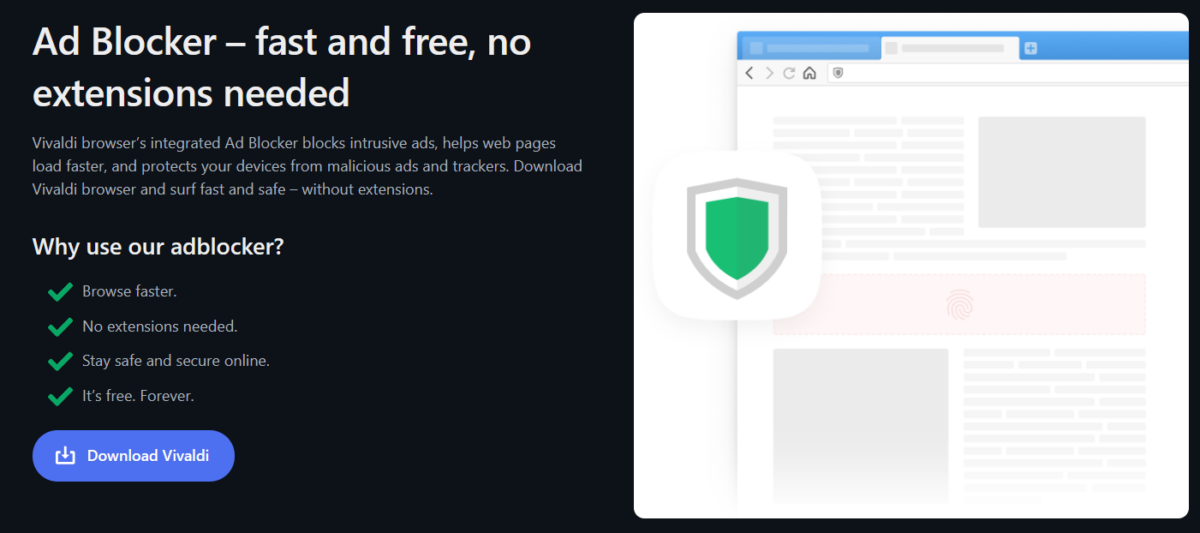
Vivaldi is a privacy-respecting browser that has an extensive platform presence covering Windows, macOS, Linux, Android, iOS, and Android Automotive OS. Coming to its ad-blocking, it’s 100% free and needs no additional extension. Still, it gives users to choose among three modes of blocking ads and trackers, just ad blocking, or no blocking at all.
Vivaldi’s native ad-blocking assures better performance with minimum issues like broken web pages. Plus, it has no premium features. In other words, everything is available for everyone without any hidden or upfront cost.
Vivaldi Pros
Browser integrated ad-blocking
100% Free adblocking and tracking prevention
Better performance than adblocking extensions
Excellent cross-platform presence
Vivaldi Cons
Limited adblocking features
Adblocking interface can feel unintuitive to beginners
Vivaldi Pricing
Free
9. Privacy Badger
Best for Automatic Tracker Blocking
Privacy Badger isn’t an ad-blocker technically. However, it blocks everything that tracks a user without their consent, including ads. And since the majority of ads have embedded tracking scripts, this extension works similarly to an ad-blocker.
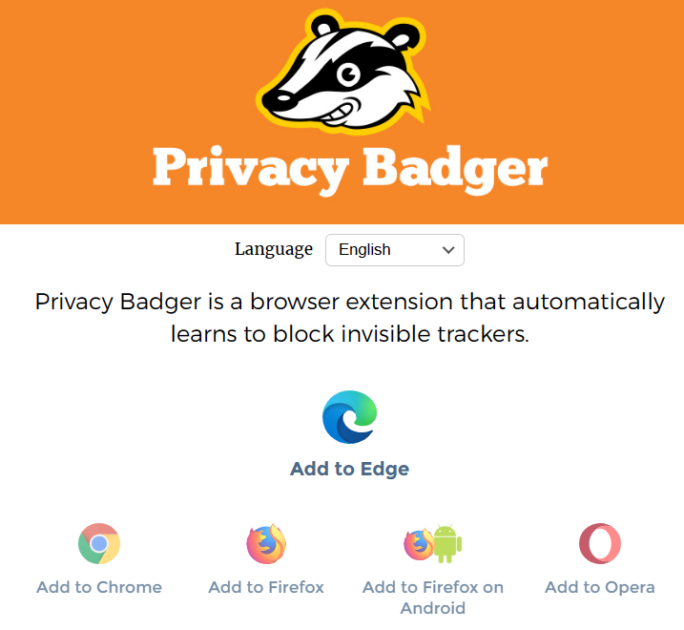
Privacy Badger is a browser extension developed by the Electronic Frontier Foundation, a nonprofit fighting for user privacy. It is completely free and is available for desktop browsers, including Chrome, Firefox, Edge, and Opera.
Privacy Badger has a very straightforward interface that allows you to disable it for specific websites.
Privacy Badger Pros
100% Free tracker blocker.
Efficiently blocks tracking ads.
Works on all web browsers.
Privacy Badger Cons
Won’t block non-tracking ads.
Fewer ad-block-specific features.
No support for Apple devices.
Privacy Badger Pricing
Free
Comparison of the Best Ad Blockers
A comparison of the best Ad blockers based on bandwidth blocking, customization, and availability.
| Ad Blocker App | Blocking Bandwidth | Customization | Availability |
|---|---|---|---|
| AdLock | Spyware filters, social media filters, Language filter, and Allowlisting | Spyware filters, social media filters, Language filters, and Allowlisting | Apps for Windows, macOS, iOS, & Android. Extensions for Chrome, Firefox, and Safari. |
| Avast AntiTrack | Targeted ads and tracking cookies. | Website allowlist | Apps for Windows, Mac, and Android |
| AdGuard | Intrusive pop-ups, banners, & video ads. | Custom rules, language filters, allowlist, & parental control | Apps for Windows, Mac, Android, iOS. Extensions for Chrome, Firefox, Safari, Edge, Opera, and Yandex. |
| AdBlock | Intrusive pop-ups, banners, & video-ads. | Custom rules & allowlisting. | Extensions for Chrome, Firefox, Edge, Opera, Safari, and Samsung Internet |
| Clario | Pop-ups, malware, & trackers. | Allowlisting | Apps for Windows, macOS, iOS, and Android. Extensions for Chrome and Safari. |
| Adblock Plus | Video ads, cookie banners, website notifications, survey requests, and pop-ups. | Allowlisting | Extension for Chrome, Firefox, Safari, Edge, Opera, Yandex and Samsung Internet. |
| Ghostery | Ads, cookies, popups, & trackers | Custom rules, allowlists. | Extension for Chrome, Firefox, Safari, Edge, & Opera |
| Vivaldi | Ads and trackers | Allowlisting | Apps for Windows, macOS, Linux, Android, iOS, & Android Automotive OS. |
What is Ad Blocker?
An ad-blocker is a standalone application or a browser extension used to prevent ads from appearing on web pages. Depending on the specific blocker, these apps ensure a cleaner, private, and non-intrusive user experience throughout the operating system, specifically within the web browser.
Some adblocking tools can also work as anti-tracking software.
Though they sometimes overlap, ad blocking and anti-tracking are two different domains.
Importance of Adblocker for Improving Online Experience
Adblockers are important for a consistent user experience across the web. These apps stop invasive elements, such as pop-up ads, auto-play videos, ad & cookie banners, and more, from eating up the browsing space and bandwidth.
Most ad blockers can be configured to allowlist websites, which helps publishers to monetize their content. Besides, advanced adblockers also safeguard a user from malware and digital profiling (used in targeted advertisement).
How Ad Blocker Works?
Ad block applications work on the principle of filters.
Put simply, when we enter a URL, the web browser requests a number of resources from the target server, including text, images, ads, and anything else the owner has included in the web page.
Ad-blocker tools analyze the outgoing requests and use predefined filters to intercept the ones downloading ads, resulting in a cleaner and faster end-user experience.
Benefits of Ad Blocker Software
An ad-blocker software provides the 7 benefits listed below.
- Improved Browsing Speed: Since ad-blockers reduce the number of outgoing requests, it reduces the time the browser takes to display the webpage.
- Enhanced Privacy and Security: Most ads track users across devices and platforms for digital fingerprinting. Some ads also redirect users to malicious websites (a process known as malvertising) to steal their personal information. Blocking such ads helps in better online privacy and security.
- Better User Experience: Ads take up crucial screen space, obstructing users from consuming the content aesthetically. Some ads even take the entire screen or pop-up playing ad videos. Removing all this nuisance helps the webpage look better and keeps the user happy.
- Data Savings: Reducing the number of requests results in lesser data consumption, which is good for users on limited data plans.
- Battery Life Extension: Adblockers definitely improve the battery life. However, the magnitude of improvement depends on the total time consumed in visiting ad-riddled websites and the nature of ads served.
- Supporting User Choice: While ads are sometimes the only monetization option a publisher might have, inundating a user with relentless advertising serves no purpose. Moreover, tracking a user across the internet isn’t ethical at all. In such cases, ad-blockers arms users to choose which ads to see or block all of them.
- Increased Productivity: Using adblockers reduces page loading times and avoids distractions to boost productivity.
How to Choose the Best Ad Blocker
Choosing an ad blocker isn’t straightforward and depends on the 9 factors discussed below.
- Ad Blocking Requirements: Decide what you want: basic ad blocking, adblocking plus tracking prevention, or ad-blocking with anti-malware and anti-tracking capabilities.
- Evaluate Blocking Capabilities: Not all adblockers help you get rid of every ad. Some tools might be good at stopping banners, while others might also cover pop-up videos. So, it’s best to check the adblocker website to see what it works for. Besides, it’s important to check if they have availability on the platform of your preference.
- Assess Privacy Features: Check if the ad blocker has additional features, such as custom rules, anti-fingerprinting, auto-consent, and more, which can come in handy while browsing the internet. They keep a user identity anonymous and help customize the overall experience.
- Consider User Experience: While there is not much to look out in a adblocker user dashboard, still, the ease with which some tool inform users about ads, tracking, and else can be a differentator.
- Review Compatibility: Some adblockers don’t function well with other tools, such as VPNs, as they might have their own built-in ad blockers. Therefore, check out if they will be compatible with your existing applications and devices.
- Understand the Impact on Sites: Not only do adblockers close an important monetization avenue for websites, but they can also affect their overall functionality. So beware of the possibility of adlockers breaking web pages.
- Read Reviews and Testimonials: Forums like Reddit and Quora are good places to look into user testimonials about specific tools. They are generally unbiased and give crucial insights to help a user decide.
- Consider the Cost: Multiple good adblockers are available for free. However, some advanced features or specific applications can be reserved for paid users. Evaluate whether the extra goodies are worth the cost for your use case.
- Test Before You Commit: The good thing about most paid ad blockers is a free premium trial or a toned-down free version. This allows users to test a tool thoroughly before paying anything.
Impact of Ad Blocking on Content Creators
Medium and small-sized content creators have ads as one of their biggest (sometimes the only) sources of income.
Adblockers not only dry out this revenue stream, but can break certain webpages. This may appear malfunctioning to unaware users, leading to increased bounce rates, which may inflict further damage on the publisher’s online presence.
How to Install and Configure an Ad Blocker
Steps to install and configure an ad-blocker depend on the specific software, its type (browser extension or native application), and the platform (Windows, macOS, Android, etc.).
One case is installing adblocker extensions on major browsers. A user should download them from the official browser stores (e.g., Chrome web store). Afterward, it’s simply clicking on a button like Add to browser_name to use it within that browser.
Installing the native applications can involve specific steps. You should refer to the tool’s documentation or support for exact steps.
Frequently Asked Questions
Ad blocker’s efficiency can vary based on operating systems and ad type. The optimal method to choose the best ad blocker is to install a few and see them firsthand.
Ghostery is a 100% free ad blocker browser extension. Besides, Vivaldi is a free browser with an integrated ad-blocker.
AdBlock is a very powerful ad-blocking browser extension, but some users may have different preferences, such as blocking cookie banners or applying custom rules, which are paid features. Similarly, it lacks an application for system-wide ad blocking. Therefore, it’s great if AdBlock works for you, but there are options like AdGuard and AdLock, which a user can also try out.
AdBlock has a free version, but some advanced features like cookie banner blocker, custom rules, dark mode, themes, etc., are reserved for paid subscriptions.

